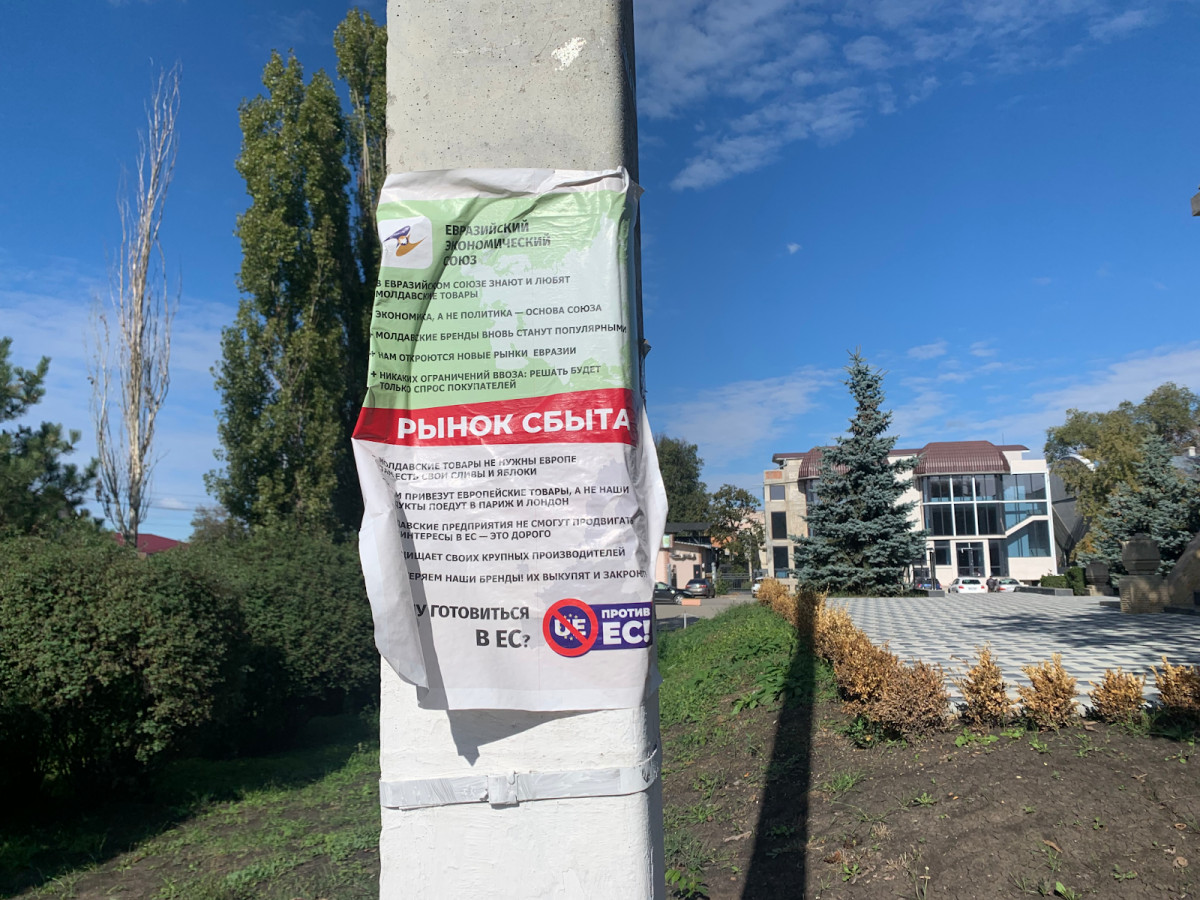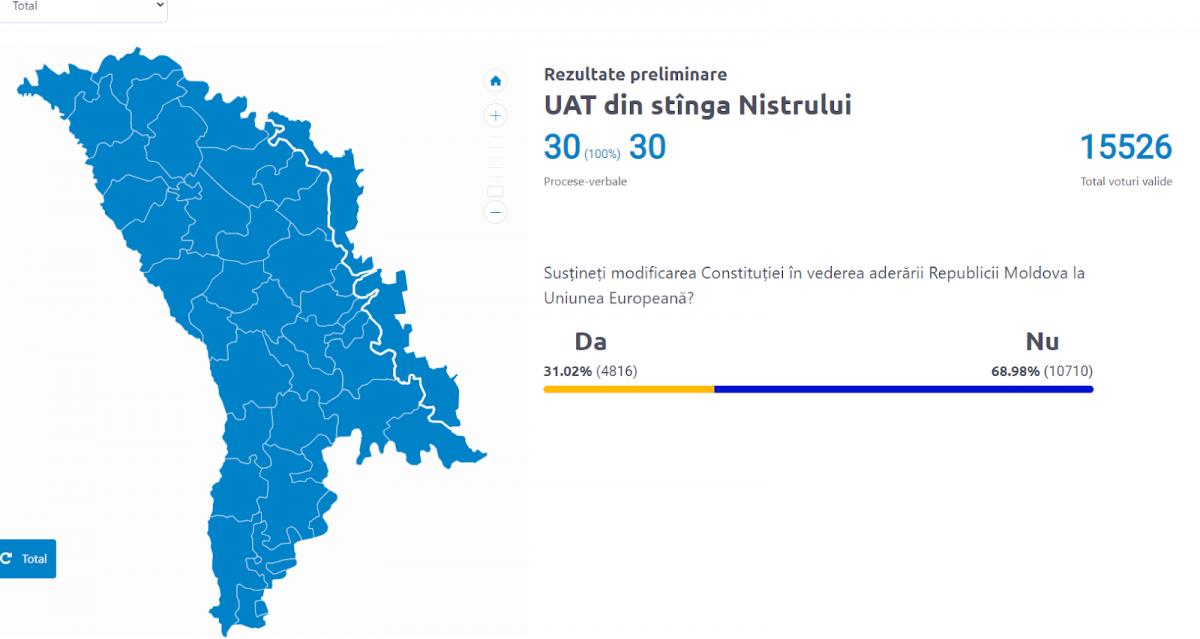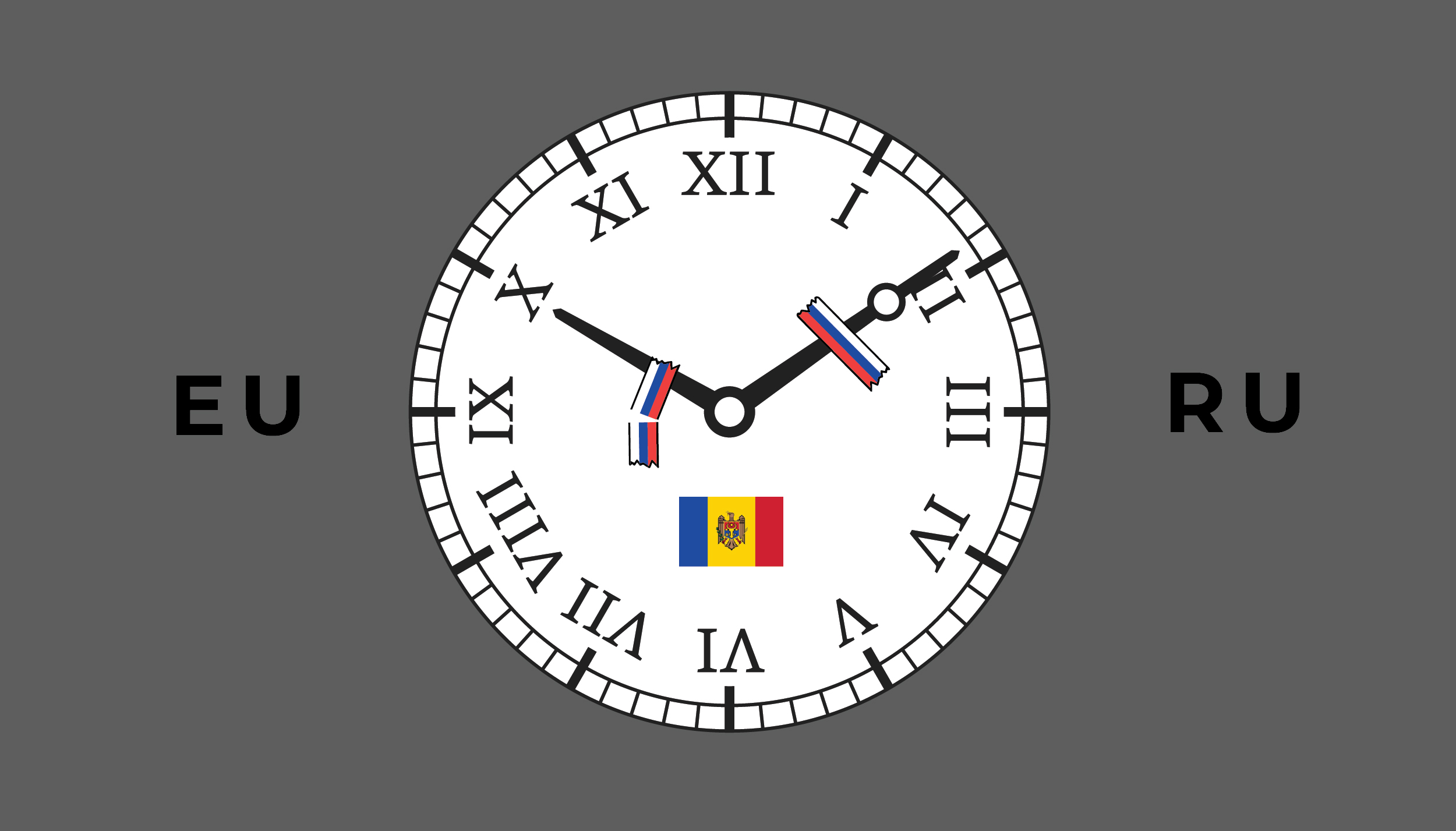

“Ukrainian involvement,” “dragging Moldova into war against Russia,” and potential “repressions against the opposition and media” — these were the scare tactics used by Russian agitational propaganda in response to the October 20 vote.
On October 20, Moldova held the first round of presidential elections along with a referendum on joining the EU. According to the Central Election Commission, the current pro-European president, Maia Sandu, received support from 42.5% of voters. At the same time, her opponent from the pro-Russian opposition Party of Socialists of the Republic of Moldova (PSRM), former prosecutor general Alexandr Stoianoglo, garnered nearly 26% of the votes cast. A total of 11 candidates participated in the election, yet only Sandu, Stoianoglo, and another candidate, politician Renato Usatîi, exceeded 10% of the vote. Since no candidate secured more than 50% in the first round, a second round will be held on November 3, where Sandu and Stoianoglo will compete for the presidency.
Answering the referendum question, “Do you support amending the Constitution to enable the Republic of Moldova’s entry into the European Union?” 50.46% of voters answered affirmatively. However, the margin with those who voted against (49.54%) was minimal, amounting to only about 13,000 votes.
Commenting on the election results on October 21, President Maia Sandu stated that both during the campaign and on election day, there was an ongoing disinformation campaign, which she called “an unprecedented assault on freedom and democracy.” Previously, Sandu had frequently reported attempts by businessman Ilan Shor and Russian authorities to influence the elections. Shor, wanted by Interpol and hiding in Russia with support from its authorities, has been convicted in absentia in Moldova for the theft of €1 billion from three banks. The EU's foreign affairs spokesperson, Peter Stano, also condemned the alleged attempts to bribe voters, noting that the elections took place amid unprecedented interference from Russia:
“We know that this vote took place in the face of unprecedented interference and intimidation from Russia and its proxies, who sought to destabilize the democratic process in Moldova.”
To analyze the narratives of Russian propaganda, Detector Media processed a dataset that included a sample of 402 messages from the Ukrainian and Russian segments of Telegram, provided by data supplier LetsData. Additionally, a sample of 860 messages from ten local Moldovan Telegram channels on October 20–21 was reviewed, featuring keywords such as “Sandu,” “referendum,” and “elections.” These channels were selected based on previous studies of Moldova's information landscape and the exposure of propaganda Telegram channels disguised as a network of “news” channels.
Russian disinformation campaign against Sandu
Months before the election, Russians and their allies among the candidates made disinformation an integral part of the campaign, as evidenced by a series of studies from European organizations, including the European Digital Media Observatory (EDMO). Throughout the election monitoring, EDMO regularly released reports based on information from local Moldovan fact-checking organizations, such as Watchdog.md and Stopfals.md. These reports revealed how propagandists spread their narratives across both digital and physical spaces—online, primarily through Telegram and other social media, and offline via posters and flyers promoting pro-Russian messages. Researchers from the Moldovan analytical center WatchDog found that two pro-Russian businessmen spent €136,000 over several months to promote anti-European narratives, aiming to influence the voting outcome.
Kremlin allies were also openly irritated by the idea of holding a referendum on Moldovan EU integration simultaneously with the election. This led to personal attacks against the current president, Maia Sandu, who is seeking re-election, with claims that the election itself was pre-determined and fraudulent. They argued that the referendum was not genuinely about EU integration but rather “violated” Moldova’s Constitution. During the campaign, Russian propaganda messages were dominated by claims that “Sandu has driven the country to ruin,” “shut down independent media,” “will soon arrest the opposition,” and “is handing Moldova over to the West.”

An example of anti-EU leaflets against Moldova's EU membership. Source: Movement “Chesno”
Several pro-Russian local Telegram channels nearly simultaneously shared a deepfake video disguised as campaign material for Maia Sandu a few days before election day. The identical video appeared in at least three of the analyzed Telegram channels on October 16 and 17 ("Gagauz Republic," "Prydnestrovets,” and “112.md — Moldova News 24/7”). Detector Media translated the Romanian audio track used in the deepfake. In the two-minute video, the current President of Moldova supposedly “repents” for her stance, campaigns against herself, and calls for a “no” vote in the referendum:
"No one will accept Moldova into the EU even in 30 years. I know for sure that once the war in Ukraine ends, we'll be next. If I remain president, I'll have to ban all independent media and launch criminal cases against opposition politicians. Vote for any candidate, just don't vote for me or this fake Euro-referendum. My defeat is the only chance to save Moldova and your children's lives."
This was not an isolated instance of using deepfakes involving Maia Sandu during the campaign. Politico published a study by the organization #ShePersisted analyzing cases of gendered disinformation and discrimination in Moldova. Researchers from #ShePersisted reported cases where social media spread fake videos of Sandu, such as one showing her supposedly "resigning" while wearing a hijab and offers of bribes to voters. They also uncovered a Facebook network associated with oligarch Ilan Shor, which posted hundreds of ads likely related to voter bribery, collectively viewed over 155 million times. Journalists from Ziarul de Gardă also released an investigation into a voter bribery network linked to Shor.
The preparations for the referendum and presidential election highlighted the unstable internal dynamics in Moldova. Specifically, the pro-Russian local authorities in the autonomous region of Gagauzia sided with candidates aligned with pro-Russian oligarch Shor, whose Telegram channels were blocked shortly before the election. The governor of Gagauzia, Evgenia Gutsul, is a suspect in a criminal case related to disinformation and her trips to Russia to negotiate collaborations in various areas. Propagandists tried to portray Gutsul as a victim and Sandu as a usurper looking to score political points before the election.
In pro-Russian Telegram channels, Gagauzia’s leader received disproportionate coverage compared to other candidates, with reports on her every move, especially during her trips. Gagauzia, home to about 155,000 people or 4.6% of Moldova’s population, became Moldova’s most anti-EU integration region, surpassing even unrecognized Transnistria. According to the referendum results, 5.16% of Gagauzia residents voted “for” EU membership, while nearly 95% voted “against.” In the presidential election, local native Alexandr Stoianoglo took first place with almost 49% of the vote. In Transnistria, the referendum results were 31% “for” and nearly 69% “against.”
The scale of Russian disinformation during the campaign was so extensive that, weeks before the election, European diplomats, including German Foreign Minister Annalena Baerbock, began warning about its impact on the voting process. Propagandists from anonymous Telegram channels responded by spreading conspiracy theories about “Western oversight” of Moldova, claiming that “people in the U.S. Embassy are working to ‘organize the elections correctly.’”

Results of the referendum vote on EU membership in unrecognized Transnistria. Source: website of the Central Election Commission of Moldova
There were also instances of cyberattacks. According to The Record, Moldova's parliamentary email servers faced several hacking attempts in the week leading up to election day. Cybersecurity experts are investigating the scope and impact of the incidents and monitoring for potential misuse of stolen data. On election day, Moldova's Information Technology and Cybersecurity Service (STISC) reported a disinformation campaign spreading through instant messaging platforms, particularly WhatsApp. These manipulations aimed to sway public opinion on the elections and referendum. On October 10, Meta blocked several pages linked to Ilan Shor, his political party (the “Chance” party), and key allies, including the head (bashkan) of the autonomous region of Gagauzia, Evgenia Gutsul. Overall, Meta removed seven Facebook accounts, 23 pages, one group, and 20 Instagram accounts for violating its policies on disinformation. This network also included fake accounts on Telegram, the Chinese platform TikTok, and the Russian site “Odnoklassniki” (OK.ru).
Reactions to the "Doomsday"
On election day, propagandists ramped up their activities as expected. Moldovan police arrested a group at the border attempting to manipulate the election in favor of pro-Russian candidates, potentially influencing up to 300,000 votes. In an effort to divert attention from this, propagandists claimed that the true manipulators were allegedly the current authorities. From the start of the campaign, propagandists emphasized that the ruling PAS party was relying on the votes of the diaspora in Europe and North America. At the same time, they argued that Moldova's largest diaspora in Russia was "left to fend for itself," — suggesting that people from across the country were forced to travel to Moscow as the government had opened only two polling stations there. “The Sandu’s regime did not let Moldovan residents in Russia vote, sending only 10,000 ballots to the Moscow station,” wrote pro-Russian blogger-propagandist Dmitry Vasylets on his Telegram channel. On voting day, propagandists also spread the narrative that it was unfair for “people with expired passports who have lived in the West for years and don’t plan to return to Moldova” to determine the future of Moldovans.
Propagandists circulated posts claiming that the diaspora’s votes were allegedly falsified as well. An anonymous Telegram channel from the Detector Media analysis sample shared a story of a “girl” who reportedly went to a polling station in a Florida city only to find out that her vote had supposedly already been counted at a polling station in Italy, with claims this was not an isolated incident. Complaints about vote rigging also extended to the referendum.
Propagandists asserted that Romanian-speaking voters supposedly didn't understand what they were doing and simply voted as they were told. This created an antithesis portraying pro-European, Romanian-speaking voters as "foolish puppets" controlled by the West while Russian-speaking opponents of EU integration were painted as "wise and enlightened." Overall, they aimed to create the impression that Moldovans did not understand what they were voting for, as the opposition "failed" to clarify the true meaning of their choice.
Reactions to the referendum and election results
The results sparked reactions among propagandists and pro-Russian candidates. Adding to the intrigue was the fact that early in the vote count, the percentage of supporters of EU integration was lower than that of its opponents. Within Moldova, 46% of citizens voted “for” amending the Constitution to join the EU, and only after counting the diaspora votes did pro-European support reach a majority of 50.5%.
Following the publication of the final referendum results, propagandists began circulating various explanations for what happened. The day after the results were published, pro-Russian local channels pushed the narrative that several candidates who appeared to support Russia had "actually" sided with Sandu. They claimed that by calling for a boycott of the referendum instead of voting "against," voters were prevented from tipping the results toward a referendum failure. These candidates were branded as traitors and "spoilers of Sandu's gang's fraud":
"Well, Dodon, Kiku, Tkachuk, Chubashenko, Renato the blabbermouth, and others — how will they explain now who they 'boycotted' for??? With such a turnout???? What about the referendum result 'FOR'???? And how about 'AGAINST'???? It's you, along with your deaf strategists, who betrayed the Moldovan people! You — who threw away the people's crucial votes by calling for a referendum boycott!" stated a post from an anonymous Moldovan channel with nearly 6,500 subscribers (original spelling preserved — Detector Media’s note).
In the analyzed sample of local channels, similar posts accusing specific candidates of botching the boycott strategy were published 16 times. However, this is a clear example of "changing tactics mid-air" since propagandists themselves tried to depress referendum turnout during the campaign using fake videos simulating "Sandu's campaigning." According to Moldovan law, the minimum quorum for a valid referendum requires one-third of all registered voters to participate, and this turnout was achieved. That’s why pro-Russian candidates initially called for a complete “boycott” of the referendum. Once this strategy failed, they reversed course and crafted a new explanation to rationalize the results.
Despite her first-place finish, propagandists painted Sandu's results in the darkest light possible. They claimed Western media openly reported her failure, that she would certainly lose the second round, and that leaders of many influential countries supposedly "are in no hurry to congratulate Sandu on her victory":
“No one knows why India, China, Brazil, South Africa, Saudi Arabia, and Turkey haven’t congratulated Maia Sandu and her company? Are they not pleased?” asked a Moldovan Telegram channel with nearly 30,000 subscribers in a sarcastic post.
Some messages referred to “local witnesses” who claimed they were “in shock and despair” over the results due to “rigging.” Other propagandists even declared that “Europe stole Moldova,” saying that democracy “died in these elections.” This was framed as proof that democracy is ineffective and should be replaced by a better (pro-Russian) system. Some went as far as comparing Sandu to “a broken clock that’s still right twice a day.”
"European integrators raped Moldova at the behest of their masters from the West. They simply stole the elections and referendum by writing down the desired results. But even then, they screwed up a bit," posted the authors of an anonymous channel with over 167,000 subscribers, using a metaphor to express their discontent with the election and referendum results.
The Ukrainian "trace"
Propagandists continuously attempted to draw a false connection between the referendum and election results in Moldova and the “ruin” in Ukraine, suggesting that voting for Sandu and supporting the EU would lead to Moldova’s downfall and a new war, allegedly in Ukraine’s interest. Pro-Russian anonymous Telegram channels claimed that Ukrainian authorities supposedly tried to disrupt the elections or stage a provocation to secure Sandu’s victory in the second round. According to them, Sandu needed this win to start a war in 2025 with Ukraine’s support, aiming to prevent her party’s “failure” in next year’s parliamentary elections and retain a “monopoly on power.”
The analyzed sample included posts alleging that Andriy Yermak, Head of the Office of the President of Ukraine, personally proposed a "risky and unconventional plan" to strengthen Sandu's domestic position. Here, propagandists threatened with a "Ukrainian Armed Forces operation in Transnistria," implying that Sandu was prepared to impose martial law to cancel the second round and thus maintain power. This would supposedly allow Ukraine to "pursue its interests in Transnistria quietly." The supposed "Yermak-Sandu plan" to cancel the second round and the imagined "Ukrainian intervention" in Transnistria was mentioned eight times in the analyzed sample.
In a column for Politico, Gabriel Gavin and Eva Hartog describe the election results in Moldova as a “sobering reality check” for the European Union, which is gradually losing influence over Moldova and Georgia (which holds parliamentary elections on October 26) to the Kremlin.
According to Detector Media researchers, the referendum results indicate that the propaganda machine is attempting to both persuade and sow doubts, as both approaches yield the same desired effect: skepticism regarding the need for a European future. Countering Russian disinformation in Moldova requires consolidating resources at the state level and deeper collaboration with EU institutions and civil society partners.
Main page illustration: Natalia Lobach


